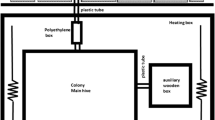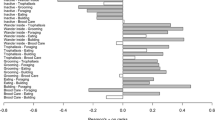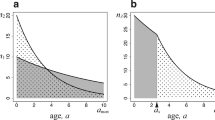Summary
When deprived of minor workers under expermental conditions, major workers of the ant Pheidble pubiventris dramatically increase their repertory and rate of activity, and the change is due in good part to the greater attention they pay the brood. When minor workers are reinstated in appropriate numbers, the majors reduce their attention to the immature stages to the ordinary, low levels. Their response consists of the active avoidance of minors while in the vicinity of the immature stages. However, majors do not turn from other majors near the brood as much as they do from the minors, and they do not avoid minors at all while in other parts of the nest. In addition, minors do not avoid either minors or majors anywhere in the nest. The result is a striking division of labor with reference to brood care.
Similar content being viewed by others
References
Wilson EO (1978) Division of labor in fire ants based on physical castes (Hymenoptera: Formicidae: Solenopsis). J Kans Entomol Soc 51:615–636
Wilson EO (1984) The relation between caste ratios and division of labor in the ant genus Pheidole (Hymenoptera: Formicidae). Behav Ecol Sociobiol 16:89–98
Author information
Authors and Affiliations
Rights and permissions
About this article
Cite this article
Wilson, E.O. Between-caste aversion as a basis for division of labor in the ant Pheidole pubiventris (Hymenoptera: Formicidae). Behav Ecol Sociobiol 17, 35–37 (1985). https://doi.org/10.1007/BF00299425
Received:
Accepted:
Issue Date:
DOI: https://doi.org/10.1007/BF00299425




